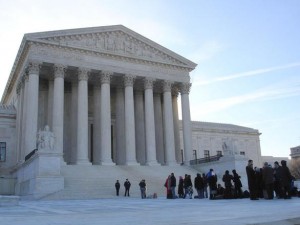Jean O’Grady
-
 Technology
TechnologyDocket Navigator Litigation Analytics Platform Acquired By UK News Platform Law Business Research Ltd.
What can Docket Navigator subscribers expect going forward? -
 Technology
TechnologyWhat's New At Casetext: Parallel Search And DIY Neural Networks
Bringing neural nets to the law.  Sponsored
SponsoredAttention Buyer: Not All Legal AI Models Are Created Equal
Legal Gen AI – Uncover the best solution for your firm.-
 Technology
TechnologyExcavating The Hyperlocal Legal Landscape With Amanda Ostrowitz Of CannaRegs
CannaRegs collects everything that might be relevant to canna law and provides early insights.
-
 Technology
TechnologyHBR Releases Interactive Library Benchmarking Survey With COVID Insights
Law firms that still relied on print found themselves locked out of their office libraries and were faced with building the digital libraries and training lawyers during the frantic early WFH days of COVID-19. -
 Technology
Technology5 (Unforeseeable, Predicable, And Surprising) Legal Tech Trends In 2020
The momentum of technological change and innovation in 2020 assured a steady stream of new products. -
 Technology
TechnologyLegaltechnologyhub.com: Find The Right Technology Tool Fast
Legaltechhub is loaded with functionality you can search or browse. Check it out today. -
 Technology
TechnologyManaging The Post-COVID Knowledge Resources Budget In An Era Of 'Rogue' Pricing: Insights From Michael Feit of Feit Consulting
Feit discusses a new report on the state of the market for major legal vendors. -
 Technology
TechnologyMeet Lawyer Entrepreneur Nicole Clark CEO Of Trellis -- The Google Of Legal Analytics
My discussions with Clark revealed a bold and unique approach to the development of her product, and a unique market strategy, to outwit the long procurement cycle in large law firms.  Sponsored
SponsoredHow To Maximize Productivity With Westlaw Precision With CoCounsel
Westlaw Precision with CoCounsel helps legal professionals get a faster start to their research. Over time, that added productivity can lead to higher-quality research and…-
 Technology
Technology12 Tips For Building Your Digital Law Library In The Age Of COVID-19
The COVID-19 pandemic is causing firms to fast forward into designing the law firm of the future. -
 Technology
TechnologyLaw Librarians Helping Law Firms Meet COVID-19 Research And Practice Challenges
Law firms have met the virtual workplace and that impact will endure. -
 Technology
TechnologyLegal Publishers Roll Out COVID-19 Resources, Toolkits, Alerts, Advice (Some Even Free)
As a new pandemic law practice emerges over the course of several weeks, check out these tools produced by legal publishers to help lawyers get oriented. -
 Technology
TechnologyIt's Budget Time! 12 Timely Tips To Help Manage Law Firm Costs
Law firms that want to invest in new technologies must subsidize investments with lean budget practices that continuously reassess all ongoing costs. -
 Technology
TechnologyThe Future Ready Law Firm: A Guide To New Technologies
Organizations that are investing in technology today believe that they are well equipped to manage change.
Sponsored

The Ethical use of Generative AI


Attention Buyer: Not All Legal AI Models Are Created Equal

New Report - Are Small Firms Achieving Their Legal Tech Goals?
Sponsored

How To Maximize Productivity With Westlaw Precision With CoCounsel


Mitigating M&A Cyber Risk: Pre- & Post-Acquisition Due Diligence
-
 Technology
TechnologyWhat Do Law Firms Need To Know About Purchasing Litigation Analytics Products?
During the Great Analytics 'Shoot-Out' at AALL, law librarians tested and compared the results of seven federal litigation analytics platforms. -
 Non-Sequiturs
Non-SequitursNon Sequiturs: 04.28.19
* Adam Feldman poses — and answers — an interesting question: are particular justices more or less partial to certain lawyers’ or law firms’ positions? [Empirical SCOTUS]
* Speaking of the federal judiciary, Carrie Severino offers this helpful scorecard of President Donald Trump’s track record on judicial appointments — which underscores, as she notes, the importance of the 2020 elections. [Bench Memos / National Review]
* And speaking of President Trump, Joshua Matz and Laurence Tribe have this excellent explanation of why the Supreme Court does not have a role in adjudicating impeachments. [Take Care]
* In the wake of the Mueller Report, Ilya Somin pushes back against conventional wisdom and takes this position: “Not all foreign interference in elections is unjustified. Far from it, in fact.” [Volokh Conspiracy / Reason]
* Fair use in the copyright context is an infamously amorphous concept — so the Fourth Circuit’s recent ruling in Brammer v. Violent Hues Productions deserves your attention. [All Rights Reserved]
* Congratulations to Westlaw Edge, voted the “best new analytics product” by the readers of Dewey B Strategic. [Dewey B Strategic]
* And congrats to Kira Systems on being picked by Bryan Cave Leighton Paisner as its AI solution for “high-volume workstreams” across the firm. [Artificial Lawyer]
* If you’re a libertarian-leaning lawyer with two to six years of experience under your belt, check out these great employment opportunities over at IJ. [Institute for Justice via Volokh Conspiracy / Reason]
-
 Non-Sequiturs
Non-SequitursNon Sequiturs: 04.07.19
* Where does Justice Brett Kavanaugh fit along the ideological spectrum at the Supreme Court? Adam Feldman evaluates the evidence thus far. [Empirical SCOTUS]
* Speaking of SCOTUS, Frank Pasquale takes Neal Devins and Lawrence Baum’s new book, The Company They Keep: How Partisan Divisions Came to the Supreme Court (affiliate link), as a jumping-off point for exploring the political polarization of SCOTUS. [Balkinization]
* Texas v. Azar, the Obamacare case now pending before the Fifth Circuit, makes for unusual alliances — how often do you see Jonathan Adler, Nick Bagley, Abbe Gluck, and Ilya Somin on the same amicus brief? [Take Care]
* David Bernstein offers some thoughtful reflections — with which I happen to agree — on how some conservatives responded to the nominations of Neomi Rao and Jessie Liu. [Volokh Conspiracy / Reason]
* Joel Cohen has a question about Robert Mueller: “What did he know, and when did he know it?” [The Hill]
* And Cohen also has this interesting interview with Justice David Wecht of the Pennsylvania Supreme Court, about an important (and disturbing) subject: the recent rise in anti-Semitism, in America and abroad. [Tablet]
* If you share my interest in litigation finance, then you might be interested in this great new resource: a comprehensive digital library of documents relating to the litigation-funding industry. [Litigation Finance Journal]
* What trends and technology will shape the future of the legal profession? Jean O’Grady discusses highlights from a new report by Wolters Kluwer. [Dewey B Strategic]
-
 Non-Sequiturs
Non-SequitursNon Sequiturs: 03.03.19
* Several weeks after its release, Over My Dead Body, Wondery’s new podcast exploring the Dan Markel case, continues to top the podcast charts — and creators Matthew Shaer and Eric Benson have some thoughts on why the case has seized the public imagination. [Inside Edition]
* The Keith Tharpe case, far from representing an isolated injustice, reflects and embodies the racist roots of the death penalty in America, according to Stephen Cooper. [CounterPunch]
* The fight against racism in the justice system has been going on (and will continue) for many years — and as Texas lawyer John Browning has discovered, trailblazing African American attorneys were fighting to integrate the bar of the Lone Star State as early as the 1800s. [Texas Lawyer]
* I’ve previously argued against treating blue slips as senatorial vetoes of judicial nominees, based on their consequences for the federal judiciary — and as Thomas Jipping points out, history supports treating blue slips as a senatorial courtesy, nothing more. [Bench Memos / National Review]
* Don’t be fooled by the high level of unanimity in the Supreme Court’s first few decisions of the Term; greater disagreement lurks in the “shadow docket,” as Adam Feldman explains. [Empirical SCOTUS]
* The compromise appropriations bill that saved us from another government shutdown could also advance the Trump Administration’s “remain in Mexico” policy for asylum seekers from Central America — which Stewart Baker believes “may offer a better solution to the immigration crisis than the construction of a few miles of new wall.” [Lawfare via Volokh Conspiracy / Reason]
* Actor James Woods is out of the woods in a defamation lawsuit arising out of an erroneous tweet of his, thanks to this interesting ruling by the Sixth Circuit. [How Appealing]
* Jean O’Grady is excited about Panoramic, the latest offering from Thomson Reuters, which transforms “the ambitious idea of merging workflow and billing into an actual product.” [Dewey B Strategic]
-
 Non-Sequiturs
Non-SequitursNon Sequiturs: 02.10.19
* Irina Manta, a recent addition to the roster of Volokh Conspirators, assesses some of the attacks leveled against D.C. Circuit nominee Neomi Rao. [Volokh Conspiracy / Reason]
* In other nomination news, Thomas Jipping explains why conservatives should temper their excitement over those 44 judicial nominees who just got reported out of the Senate Judiciary Committee. [Bench Memos / National Review]
* Michael Dorf’s take on Chief Justice John Roberts joining the four liberals on the Supreme Court to put the Louisiana abortion law on hold: the right to an abortion is “not in quite as much immediate danger as one might have thought. And that’s not nothing.” [Take Care]
* Lawyer to the stars Alex Spiro, partner at Quinn Emanuel, talks about how he’s approaching the representation of his latest celebrity client, rapper 21 Savage. [Complex]
* On the occasion of his 15th blogiversary (congratulations!), Rick Garnett reflects on the past and future of blogging. [Mirror of Justice via PrawfsBlawg]
* Jean O’Grady chats with Pablo Arredondo of Casetext about the platform’s newest features. [Dewey B Strategic]
* And in other legal technology news, congrats to legal AI innovator Luminance on securing another $10 million in funding (reflecting a total valuation for the company of $100 million). [Artificial Lawyer]
* Last Thursday, Alabama executed Domineque Hakim Marcelle Ray and did not allow his imam to be present (even though Christian inmates can have the prison chaplain present) — a manifest injustice, according to Stephen Cooper. [Alabama Political Reporter]
* In the latest installment of his ongoing series offering advice to trial lawyers, David Berg sets forth an essential rule of cross-examination. [YouTube]
-
 Non-Sequiturs
Non-SequitursNon Sequiturs: 02.03.19
* How have personnel changes at the Supreme Court affected the dynamics at oral argument? Adam Feldman offers this analysis. [Empirical SCOTUS]
* Ed Whelan expresses relief over the White House’s new slate of Ninth Circuit nominations. [Bench Memos / National Review]
* Can President Trump declare a “national emergency” in order to build his beloved wall? The National Emergencies Act is not a blank check, according to Brianne Gorod. [Take Care]
* Should Congress pass a “deepfakes” law? Orin Kerr has some concerns. [Volokh Conspiracy / Reason]
* What’s going on with Rudy Giuliani? Joel Cohen has a theory. [The Hill]
* Jean O’Grady is pleased to see all the competition in the legal analytics space (with Precedent Analytics from Thomson Reuters as the newest entrant) — but she’d like to see more support for the competing claims of the different products. [Dewey B Strategic]
* News organizations need stricter and better guidelines when interviewing mentally ill defendants, according to former public defender Stephen Cooper. [The Tennessean]
* Have questions about the fast-approaching February bar exam? Ashley Heidemann has answers. [JD Advising]
-
 Non-Sequiturs
Non-SequitursNon Sequiturs: 01.20.19
* Adam Feldman explores the possible effect on the Supreme Court of replacing Justice Ruth Bader Ginsburg with a staunch conservative — e.g., Judge Amy Coney Barrett. [Empirical SCOTUS]
* Speaking of SCOTUS, here’s Ilya Somin’s read of the tea leaves in Knick v. Township of Scott, an important Takings Clause case. [Volokh Conspiracy / Reason]
* Stephen Embry disagrees with Joe Patrice’s suggestion that junior lawyers are going extinct, but Embry acknowledges the major effect that technology is having, and will continue to have, on legal practice and employment. [TechLaw Crossroads]
* Charles Glasser looks at what might have caused the political polarization of the modern media and its consumers. [Daily Caller]
* The prospect of Michael Cohen testifying publicly before Congress is making some people giddy — but it’s not without its downsides, as Joel Cohen explains. [The Hill]
* What can we learn from official Washington utterances about the shutdown? Here’s some intel from VoxGov, via Jean O’Grady. [Dewey B Strategic]
* Not all provisions of the Bill of Rights are created equal, according to Gerard Magliocca. [PrawfsBlawg]
* David Berg draws lessons for trial lawyers from the genius of Joe Jamail’s use of hypothetical questions. [YouTube]